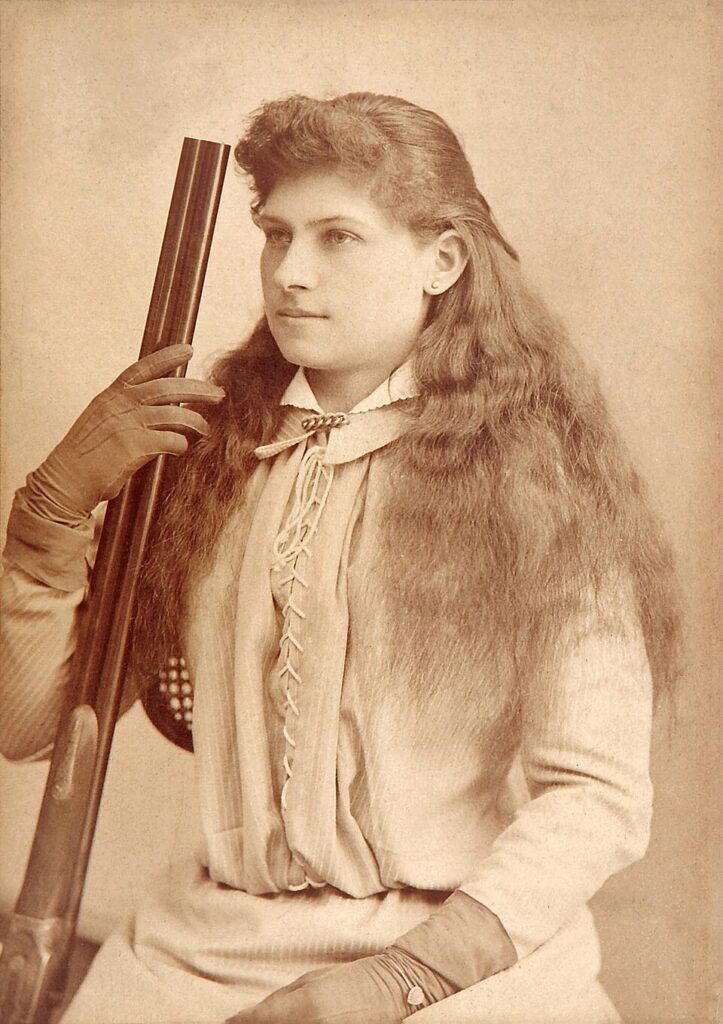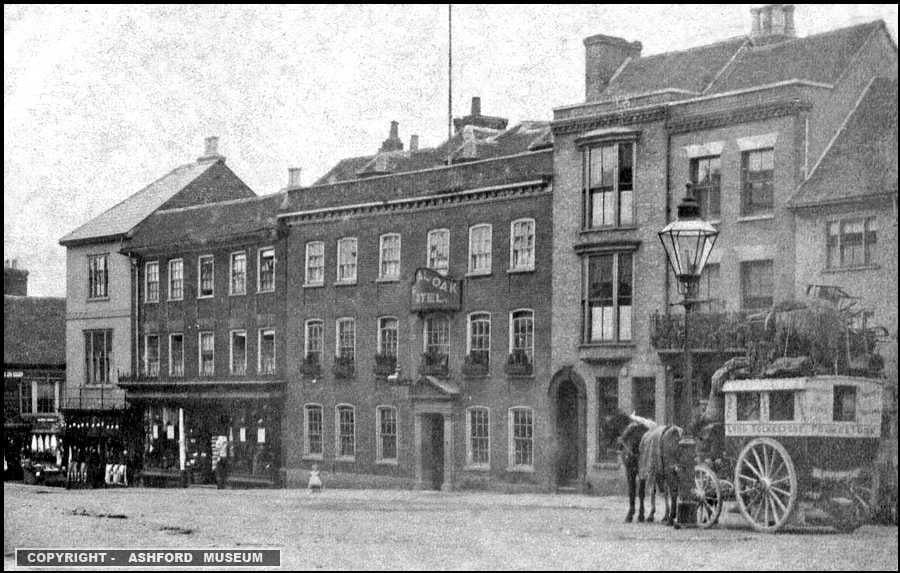
Best known as a sharp shooting show-woman, Annie Oakley was also an ardent promoter of women’s rights.
She visited the ‘Royal Oak’ hotel in the Lower High Street where she gave shooting displays to the men of the hotel’s shooting team.
Early Life
Born in 13 August 1860, Phoebe Ann Mosey, the 6th child of nine of Quaker parents of English descent in a log cabin in Darke County, Ohio, USA.
Her father, aged 61 at the time if her birth, was invalided by hypothermia suffered during a blizzard in late 1865 and died in early 1866.
As a result of poverty following her father’s death, Annie did not regularly attend school as a young child but did later in her childhood and as an adult.
At the age of nine she was admitted to Darke County Infirmary, with her sister, Sarah Ellen, where she was put into the care of the Superintendent and his wife. She was then bound out to a local family to help care for their infant son. She spent about two years in near slavery to them. Annie ran away from the couple, met and lived with another couple, the Edingtons, and returned to her mothers home at the age of fifteen.
Marriage and career
Annie developed hunting skills as a child to provide for her impoverished family.
On Thanksgiving Day 1875 the Baugham and Butler shooting act was being performed in Cincinatti. Travelling Show marksman Frank Butler, an Irish immigrant, placed a $100 bet with hotel owner Jack Frost. Frost arranged a shooting match between Butler and fifteen year old Annie. After missing his 25th shot Butler lost the match and the bet. Butler began courting Annie and they married. Records show the marriage as taking place in 1882, although some accounts give a date in 1876. This may be because Butler’s divorce from his first wife was not finalised in 1876.
Annie and Frank Butler lived in Cincinnati for a time. The name Oakley may have arisen from the neighbourhood in which they lived in Cincinnati.
The couple began performing together and joined “Buffalo” Bill’s Wild West troupe in 1885. She was given the name “Watanya Cicilla” by fellow performer Sitting Bull, which was rendered as “Little Sure Shot” in advertisements.
Oakley left the Bufflalo Bill show but returned two years later, in time for the Paris Exposition of 1889. The three year tour cemented Oakley as America’s first female star.
Oakley was severely injured in a train accident in 1901 but recovered after temporary paralysis and five spinal operations. She left the Buffalo Bill Show and in 1902 began a less taxing career in a stage play, The Western Girl, written for her.
Her trailblazing career not only broke records but also shattered gender norms of her time, paving the way for women in sports and public life. Oakley remained a vocal advocate for women’s rights, including their right to serve in the military and to bear arms.
During er career it is believed that Oakley taught more than 15,000 women how to use a gun.
In late 1922, the couple sustained injuries in a car crash that required Oakley to wear a steel brace on her right leg. She eventually performed again after more than a year of recovery, and she set records in 1924
Oakley’s health declined in 1925 and she died of pernicious anaemia at the age of 66.
William Graham
William Graham became the licensee of the Royal Oak Hotel sometime between April 1889 and December 1890.
He was born in Norfolk as William Giles, in 1849.
Between 1885 and 1889 he had travelled to America and, touted as the ‘champion wing shot of England’, participated in shooting matches there. There are records of him asking for matches with the best shots in the United States.
A match, in Philadelphia, in January 1888, which he won by three kills, was one of several with Annie Oakley.
Annie Oakley’s visit to Ashford

While touring with Buffalo Bill’s Wild West, in Europe in 1890, Annie took time to visit William Graham at the Royal Oak. A newspaper report was published of her attendance at a shooting match in the Hotel grounds.
Marvellous Shooting—
At the Royal Oak Starling Shoot on Wednesday, the company which included some of the best shots in the south of England, were unexpectedly gratified by having the opportunity of witnessing some of the wonderful shooting feats of Miss Annie Oakley (Mrs Frank R Butler). This lady, the “Little Sure Shot” of Buffalo Bill’s troupe, which is now at Strasbourg, is on a vacation visit to Mr. and Mrs. Graham, of the Royal Oak, they having been old American friends, Mr. Graham having shot four or five matches with her during his sojourn in the States. Gentlemen will have the opportunity of seeing her performances at the next few meetings, and of taking part against her at her own game at the traps. he feats she performed on the ground seem scarcely credible. Thus if Mr. Butler or Mr. Graham held out in their hands a visiting card edgeways to her, at a distance of ten to twenty paces she invariably hit the edge of the card with a bullet from a pistol. With a Holland 3-20 bore double rifle she hit successfully with bullets two marbles thrown into the air; and with a 10-shot repeating rifle she split at first shot, a piece of brick as it was thrown up the knocked to pieces with a second shot, one of the fragments as it descended. Half-pence coins and coins the size of a sixpence were also struck with bullets in the same way. Thirteen competitors came out for the handicap and it was won by Mr. Frank Tanton, of Great Chart, 25 yards who killed seven birds out of nine. Mr. Tanton’s win was a feat for a local sportsman, inasmuch as he beat two of the best shots in England, Ben Read, of Nottingham, and Robert Patch, of London. Mr. Tanton’s brother also holds a trump card in the handicap. Over a dozen sweepstakes were subsequently shot off, and a pleasant dinner party afterwards sat down at the down at the Royal Oak.
Kentish Express and Ashford News, 20th December 1890
Buffalo Bill’s Wild West in Ashford
The only record we have located of Buffalo Bill’s Wild West performing in Ashford was on the 28 August 1903. This was after Annie Oakley had left the troupe as a result of the injury suffered in a railway accident in 1901.
